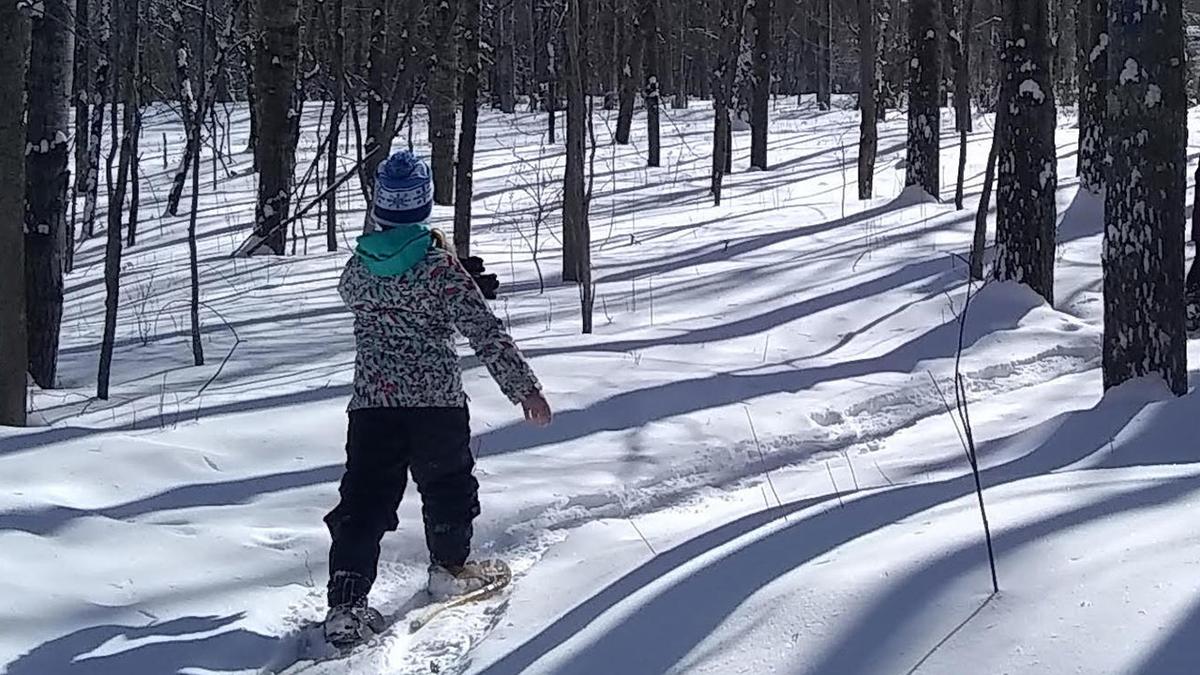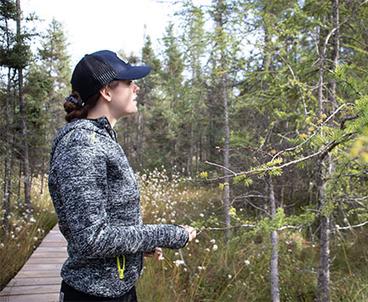UMD graduate student Hannah Juckett wants to find ways to create accessible outdoor spaces for children. She aspires to provide all children with the opportunity to get outside and explore, regardless of their ability.
After receiving a bachelor’s degree in youth studies from the University of Minnesota Twin Cities, Juckett decided to pursue a career that involved helping young people. She first worked at a residential treatment center, then with homeless youth.
Ultimately, while working at Lake Elmo Park Reserve, Juckett discovered that spaces for children with disabilities within nature were uncommon. This led her to explore the concept of nature-based education.
While working in an outdoor after-school program, she witnessed the significant impact that nature has on kids. “The joy that the students show while playing outdoors, or finding a really cool caterpillar, or even seeing a fox run by, is so easily visible and contagious that it brings joy to everyone within the group,” says Juckett.
From then on, Juckett has made it her goal to immerse children in nature because it provides a fun and liberating learning experience that she believes everyone should have equal access to.
Bringing Lessons to Life
Juckett is a student in the Masters of Environmental Education program (MEEd). What she loves about the program is that it enables her to apply her knowledge in real-world settings. Through the different classes in the program, students get to teach in a variety of schools. Juckett taught three different times at Pike Lake Elementary School and loved the experiences that she had. “We had amazing, fun experiences and got to bring lessons to life,” says Juckett.
She taught a series of science lessons about hibernation, adaption, and migration. Within these lessons, students built a den outside, examined fur pelts of different animals, and even explored the concept of “blubber,” which enables some animals to live in cold climates by staying warm with thick layers of fat. In this experiment, the students coated their hands in Crisco to mimic extra layers of fat, then immersed their hands into ice water to feel the difference in temperature that the additional fat created.During the past year, Juckett worked with Key Zone Outdoors at the YMCA. While there, she noticed that many children were initially hesitant to go outside. However, as soon as they were outdoors, she witnessed their attitude changes and how much they enjoyed nature. Providing children with this experience and positively influencing their perceptions of the outdoors was a rewarding experience for Juckett.
Most importantly, Juckett’s field experiences have taught her the value of understanding that every child comes from a different starting point in regard to spending time outside. Juckett says, “There are children who barely have the opportunities to get outdoors but then there are kids who are always outside with their parents. Not everyone feels comfortable in these spaces, so we must ease them into it.”
Researching About Resilience
Now, Juckett is thrilled to be working with David Sobel of Antioch University and Julie Ernst, a professor in the UMD MEEd program, on a grant-funded project. The grant enables her to conduct further research and create meaningful nature-based preschool activities.
The researchers are working to identify how adverse experiences during childhood can impact child development and preschoolers’ levels of resilience—or ability to withstand difficult circumstances. Juckett is excited about the research because the pandemic is one of such adverse experiences, making it a relevant and timely topic.
The idea is to determine if the children who go to nature preschools have higher levels of resilience than their preschool peers who participate in non-nature, traditional preschools. The group will also be able to examine children’s resilience levels during and after the pandemic, showing the impacts of this time period.
Hannah believes that resilience is an important quality for children to have, especially those with disabilities. With the help of nature-based education, Hannah can help children build resilience through impactful experiences outdoors.

